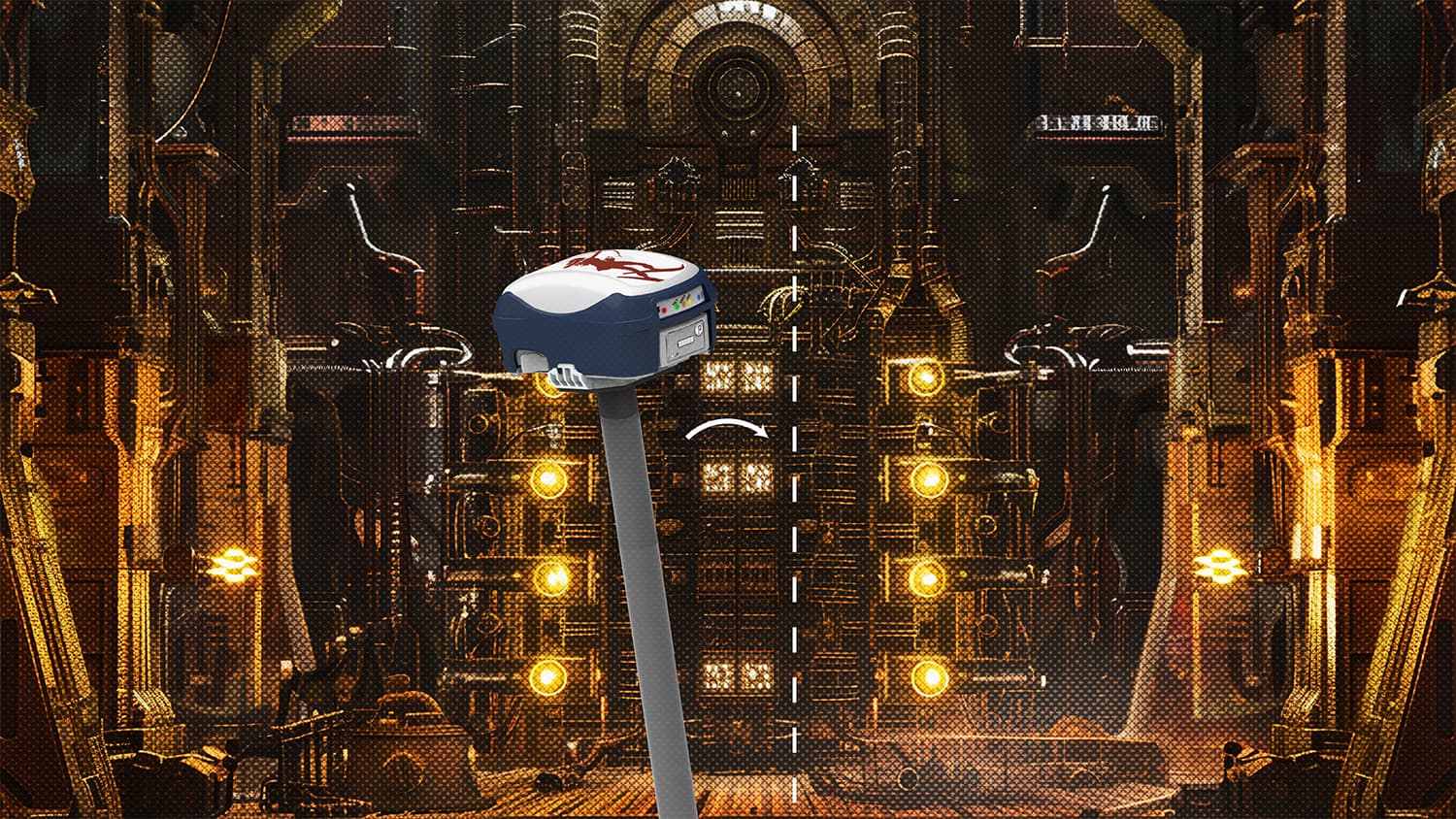Robust RTK Accuracy with the Flexibility of the Skadi Series™
The Skadi 300™ is an extremely robust RTK GNSS receiver in the Skadi Series™ from Eos Positioning Systems®. With support for all GNSS constellations, triple-frequency, and most GNSS signals, the Skadi 300 lets you obtain a unique blend of accuracy and performance in the field. The Skadi 300 includes our popular SafeRTK® feature for retaining your survey-grade accuracy when you temporarily lose internet connectivity to your source of RTK corrections. Additionally, you can use any RTK network, CORS network, base station, SBAS, and subscription Atlas® correction services with the Skadi 300. It is also device agnostic to work with any iOS®, Android™, or Windows® mobile device. In addition to the accuracy and performance features you would expect from an Eos GNSS receiver, the Skadi 300 includes additional advanced mapping capabilities available only in the Skadi Series product line. This includes Skadi Tilt Compensation™ so you can remain more productive at every point by not having to level your physical range pole. It also includes an integrated antenna and hot-swap, all-day battery to support any field mounting configuration (e.g., handheld setup, range pole, backpack).
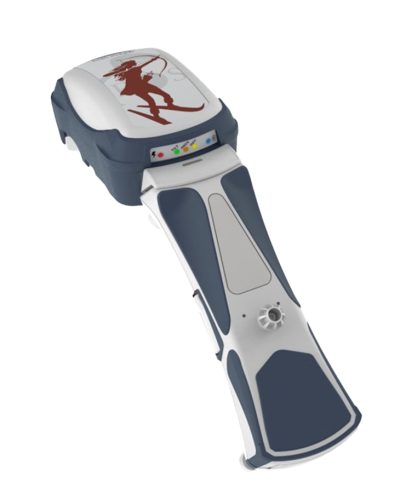
Moreover, the Skadi 300 may be optionally upgraded to include the Skadi Smart Handle™ from the standard handle. Thanks to cutting-edge LiDAR and MEMS sensor, the Skadi Smart Handle offers a unique Invisible Range Pole™ feature to provide you with continuous elevation measurements to the ground. Meanwhile, a second feature of the Skadi Smart Handle, the Extensible Virtual Range Pole™, lets you remotely capture short-distance assets on the ground and in trenches.
Use with Many Differential Corrections Sources
RTK Network & Base Station
The Skadi 300 provides, on average, 1 cm horizontal accuracy and 2 cm vertical accuracy with any RTK network or local base station. Moreover, if you temporarily lose connectivity to your corrections source, SafeRTK® will kickstart and retain your corrected accuracy level, giving you time to regain connectivity.
Atlas® Service
When a base station or RTK network are not available, you can use the Skadi 300 with an Atlas subscription service, available from Eos. Compatible subscriptions are H10 (4 cm), H30 (15 cm) and Basic H50 (30 cm).
SBAS
If 40-60 cm level accuracy is good enough for a project where you don’t have access to a free RTK network or base station, you can use the Skadi 300 with free Satellite Based Augmentation Systems (SBAS). This gives you real-time submeter accuracy anywhere a free SBAS is available.
Skadi 300 Puts RTK In Your Hand™ with Advanced Mapping Features
The Skadi 300 is eligible for two exclusive upgrades: Skadi Tilt Compensation™ and the Skadi Smart Handle™ (an optional upgrade from the included Skadi Standard Handle™). Please note these features are available only for RTK-enabled Skadi Series™ GNSS receivers, including the Skadi 300.
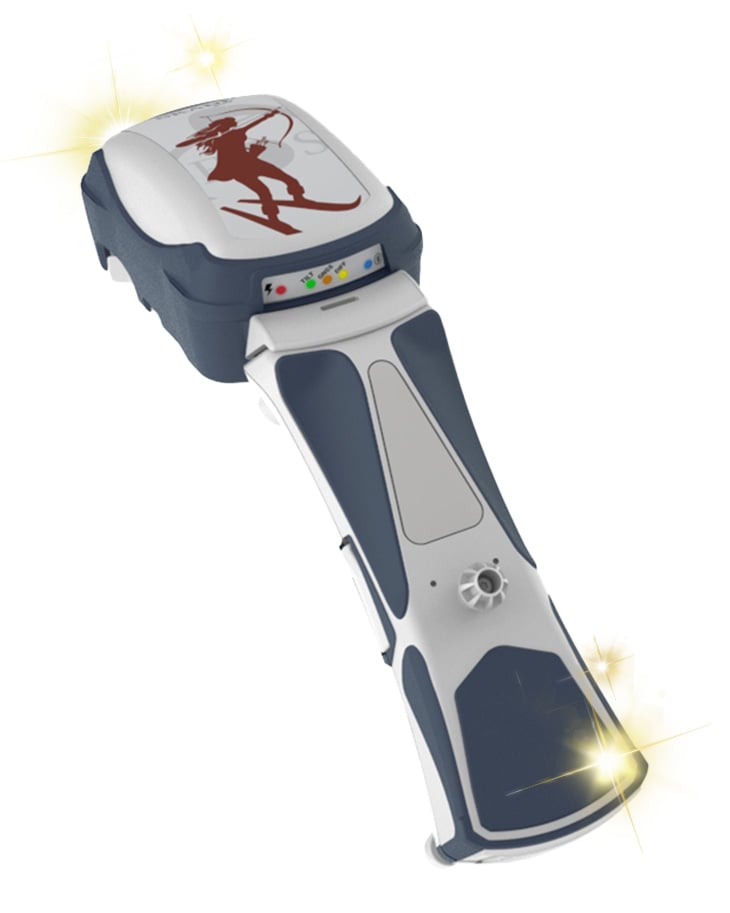
Skadi Tilt Compensation™
When you activate Skadi Tilt Compensation, you eliminate the need to level your antenna while performing RTK data collection on a range pole. With Skadi Tilt Compensation activated, you introduce only .3 mm (.01 inch) of inaccuracy per degree of tilt.
Skadi Smart Handle™
The Skadi Smart Handle is a physical upgrade to your included Skadi Standard Handle. The smart handle features two exciting and powerful features. These features include the following:
Invisible Range Pole™
The Invisible Range Pole is an innovative approach to bringing the benefits of a traditional survey range pole into your hand without the cumbersome physical weight. With the Invisible Range Pole feature, you carry a virtual gimbal that keeps you plumb to the ground. Raise, lower, or tilt the receiver, your elevation to the ground is continuously computed below the Skadi receiver in your hand, thanks to the exciting combination of LiDAR and MEMS technologies.
Extensible Virtual Range Pole™
This exciting and innovative feature allows you to extend the reach of your data collection beyond the position you physically occupy. Using a built-in green laser pointer, now you can “shoot” short-distance assets on the ground while retaining high accuracy. This is particularly useful for assets in trenches and similar environments. The Extensible Virtual Range Pole has an approximate range of about seven meters (23 feet) in bright sunlight conditions (performance may vary based on target reflectivity).
At a Glance: Discover the Skadi Smart Handle™
When you purchase a Skadi Series RTK-enabled GNSS receiver like the Skadi 300, you may optionally upgrade your Skadi Standard Handle to a Skadi Smart Handle™. Learn more about the Skadi Smart Handle here:
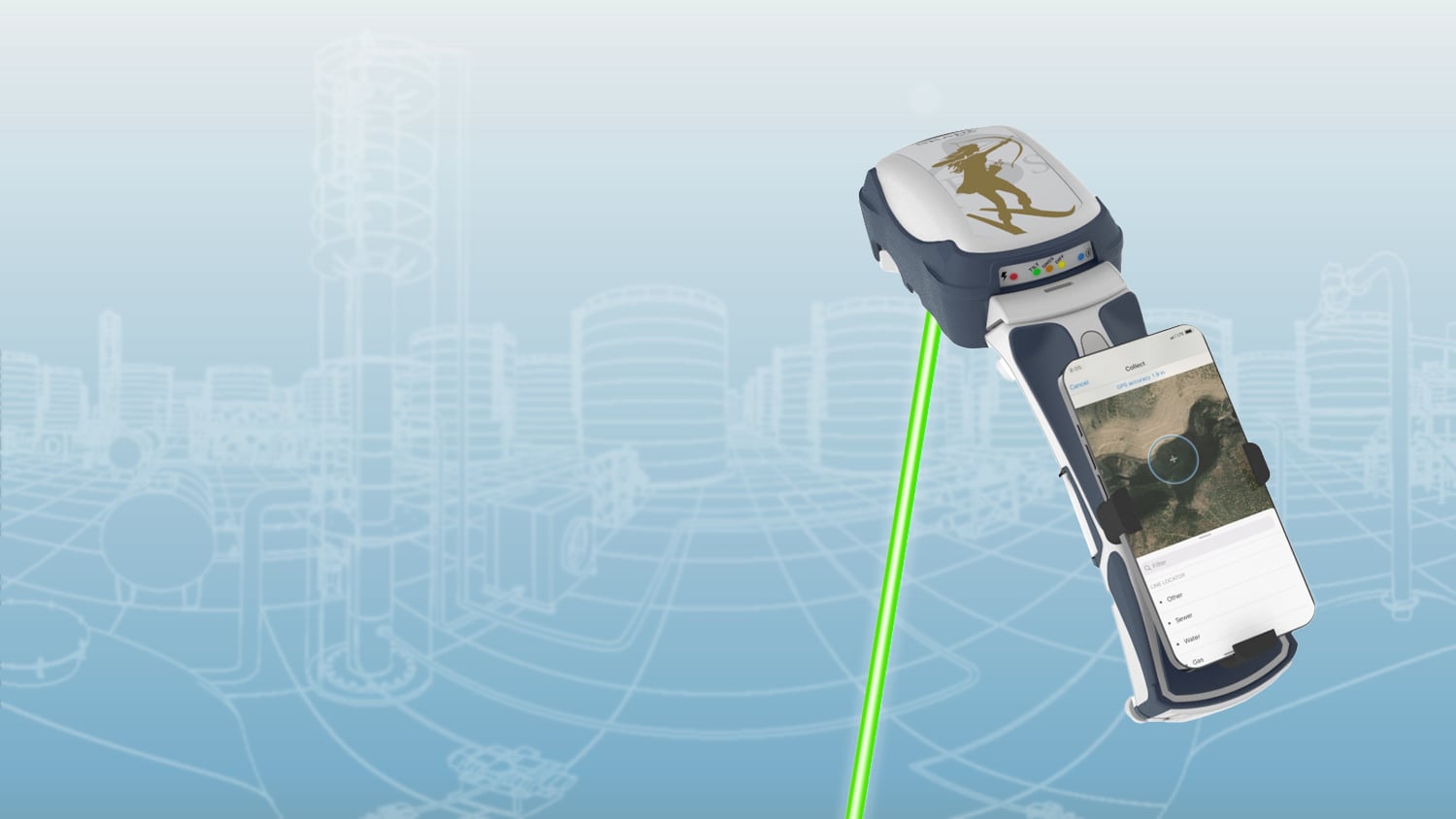
A Triple-Threat RTK GNSS Receiver
Survey-Grade RTK Accuracy
The triple-frequency Skadi 300 provides centimeter-level accuracy when connected to an RTK network or base station and decimeter-level or better accuracy when connected to Atlas® H10 satellite service.
Skadi Tilt Compensation™
The Skadi 300 may be purchased with the optional Skadi Tilt Compensation™ — boosting your field productivity by allowing you to capture points quickly without having to level your survey range pole.
Advanced Mapping Features
Upgrade your Skadi 300 to include a Skadi Smart Handle™. The Skadi Smart Handle offers two powerful features. First, the Invisible Range Pole™ acts like a plumb for continuous ground-elevation measurements. Second, an Extensible Virtual Range Pole™ lets you shoot ground assets around you and in trenches.
What Do You Get with the Skadi 300 RTK GNSS Receiver?

What Do You Get with the Skadi 300 RTK GNSS Receiver?
Open the box of this survey-grade, triple-frequency GNSS receiver!
The Skadi 300 RTK GNSS receiver comes as a complete survey-grade positioning kit. This kit includes the following:
- Skadi 300™ GNSS Receiver with Integrated Antenna
- Pole Mounting Plate for Skadi Series™
- Skadi Standard Handle™ (upgradable to the Skadi Smart Handle™)
- Phone Mounting Bracket for Skadi Series Handles
- Tablet Mounting Bracket for Skadi Series Handles
- Skadi Series Li-Ion Battery Pack
- USB-C Power Adapter
- USB-C Cable
- Skadi Series Hardshell Case
- Access to Eos Tools Pro
Click here to find more accessories compatible with this receiver.
Explore the Skadi 300 in 3D
Bring the Skadi 300 to life on your screen. Click the play button to launch the Skadi 300 3D model.
What Accuracy and Flexibility look like with the Skadi 300
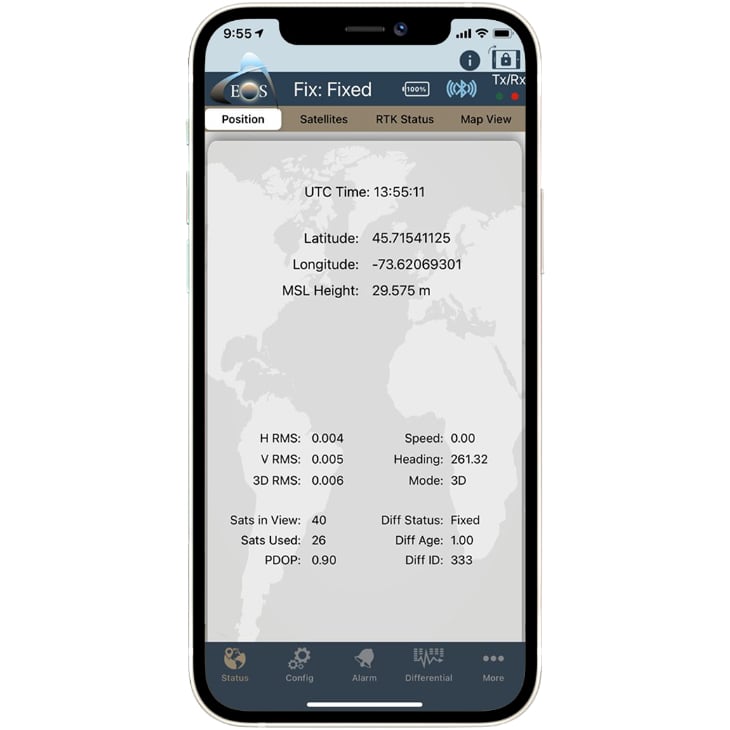

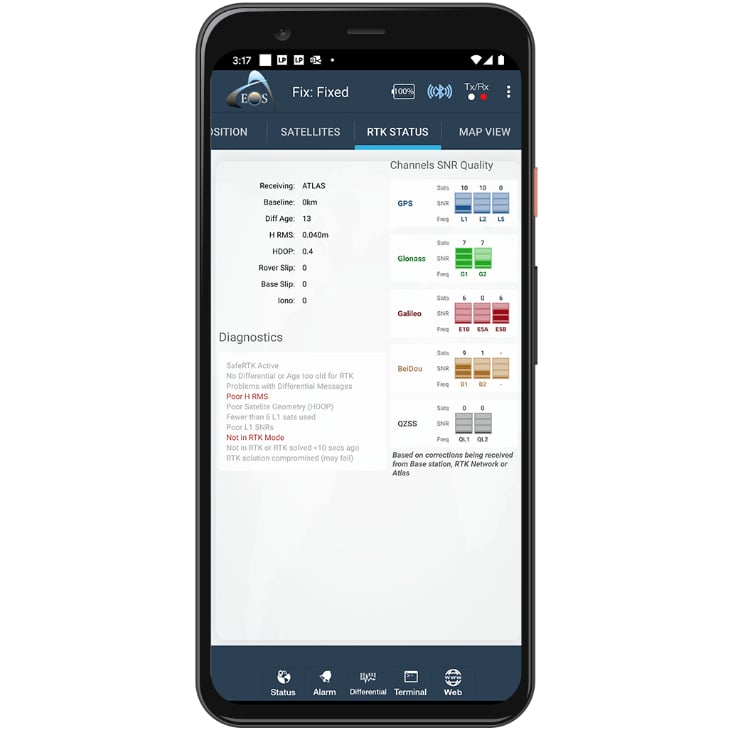
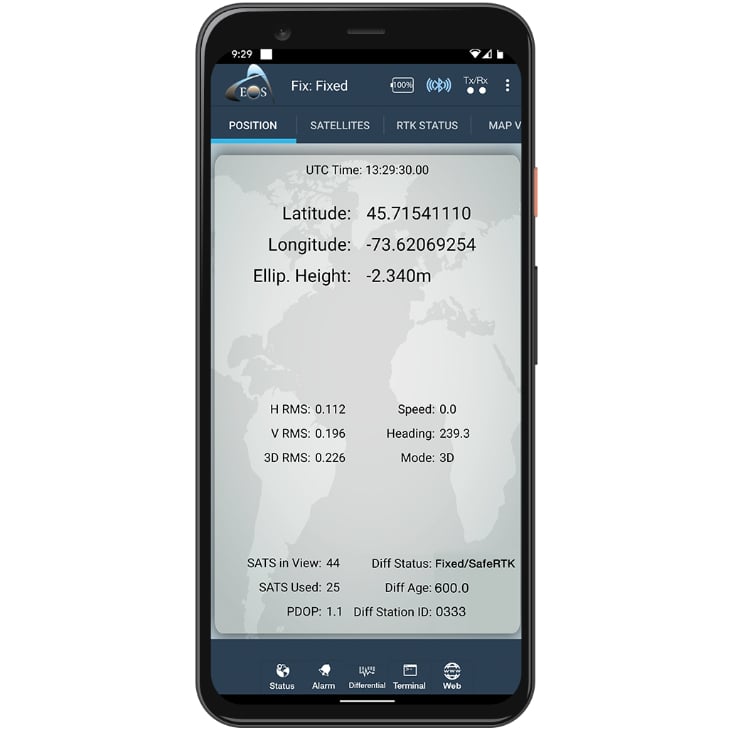
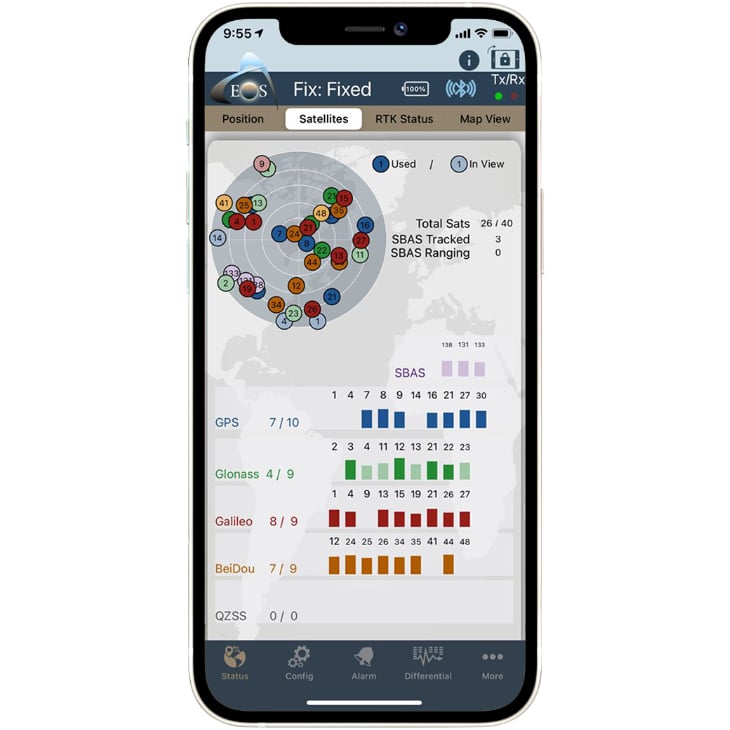
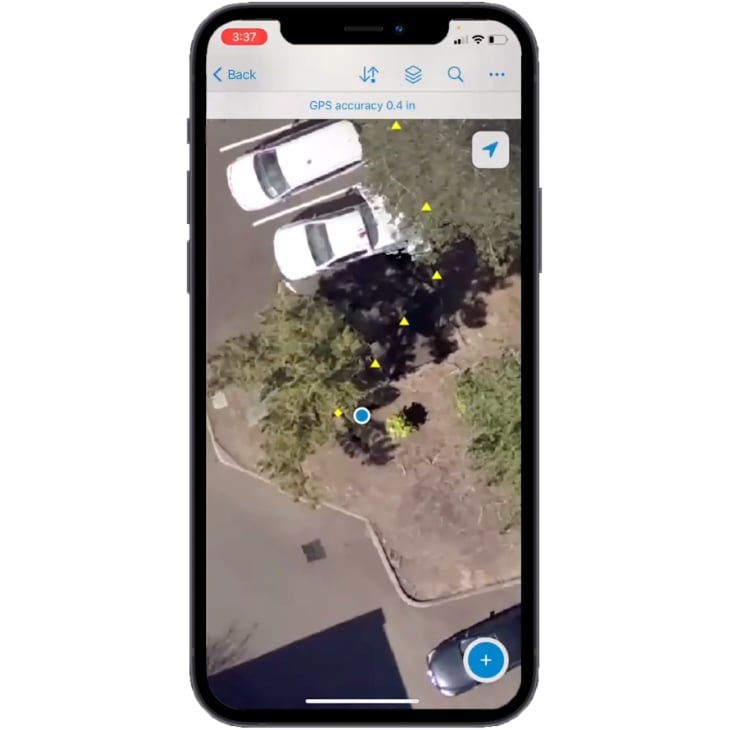
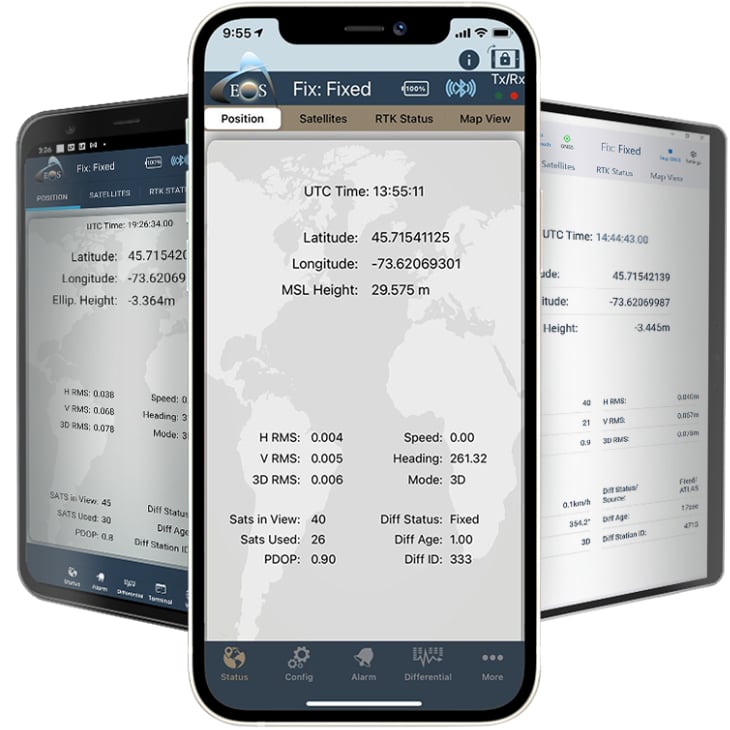
- 1 cm accuracy with RTK
- 4 cm accuracy worldwide w/ Atlas® H10 subscription
- Retain RTK in poor cell areas with SafeRTK®
- Access all GNSS constellations and signals
- Easily integrate with any mobile app
- Compatible with all mobile devices
Skadi 300 Technical Specifications
Receiver Type
- Triple-frequency, all-constellation GNSS RTK receiver with integrated antenna
Channels
- 800+ channels
GNSS Signals Received
- GPS: L1CA, L1P, L1C, L2P, L2C, L5
- GLONASS: G1, G2, G3
- Galileo: E1BC, E5a, E5b, E5, E5(AltBOC)
- BeiDou: B1i, B2i, B3i, B1C, B2A
- QZSS: L1CA, L2C, L5
- IRNSS: L5
SBAS Support
- 3-Channel, parallel tracking (with SBAS ranging)
L-Band (Atlas®)
- 1-Channel
Accuracy
- RTK: 8 mm1+ 1 ppm horizontal, 2 cm1 + 1 ppm (RMS)
- Skadi Tilt Compensation™: RTK accuracy + 0.3 mm per degree of tilt
- Atlas®: 4 cm to 50 cm, depending on subscription
- H10: 4 cm HRMS1
- H30: 15 cm HRMS1
- H50 (Basic): 30 cm HRMS1
- SBAS < 30 cm HRMS1, < 60 cm 2dRMS
- Autonomous: 1.2 meters HRMS1
Miscellaneous Specifications
- Standard Update Rate: Up to 10 Hz (20 Hz optional activation)
- Cold Start: < 60 seconds typical (no almanac or time)
- Reacquisition: < 1 second
- Maximum Speed: 1,850 kph (1,150 mph / 999 knots)
- Maximum Altitude: 18,288 m (60,000 ft)
Output Datum
- Autonomous Datum: WGS-84 (latest revision)
- SBAS and Atlas® Datum: ITRF (current year epoch)
- RTK Datum: Same as RTK base station/network
Communication
- Ports: Bluetooth®, USB-C 2.0, serial
- Pre-Qualified Bluetooth: Dual-mode Bluetooth v4.2 BD/EDR - BLE (v5.1 tested)
- Supported Bluetooth Profiles: SPP, iAP2
- Bluetooth Transmission: Class 1 with 200 m typical range2
- Data I/O Protocol: NMEA 183, RTCM SC-104, binary
- Raw Measurement Data: Binary and RINEX
- Correction I/O Protocol: RTCM 2.x, 3.x, MSM, proprietary binary
- Timing Output: 1PPS, CMOS, Active High, Rising Edge Sync, 10 kΩ, 10 pF Load (via serial port)
- Event Marker Input: CMOS, Active Low, Falling Edge Sync, 10 kΩ, 10 pF Load (via serial port)
Skadi Receiver Power
- Battery Type: Field replaceable, 24 Wh rechargeable Lithium-ion pack (rechargeable inside the receiver or separately)
- Battery Autonomy (without tilt compensation): 9+ hours3
- Battery Autonomy (with tilt compensation): 8+ hours3
- Charging Time: 2.5 hours (with supplied 20W USB-C power adapter)
- Hot-Swap Back-up Battery Autonomy: 10+ minutes
Device Compatibility
- iPhone® and iPad®
- Android™ smartphones and tablets
- Windows®, Windows Mobile®
Environmental Details
- Operating Temperature: -40° C to +85° C (-40° F to +185° F)3
- Storage Temperature: -40° C to +85° C (-40° F to +185° F)
- Humidity: 95 % non-condensing
- Compliance: FCC, CE, RoHS and lead-free
Mechanical Details
- Enclosure Material: Xenoy® with TPU overmold
- Enclosure Rating: Waterproof, designed to meet IP-67
- Immersion: 30 cm, 30 minutes
- Receiver Dimensions: 14.2 cm x 9.5 cm x 6 cm (5.6″ x 3.7″ x 2.3″)
- Skadi Standard Handle™ Dimensions: 26.6 cm x 7.6 cm x 16.2 cm (10.5” x 3.0” x 6.4”)
- Weight with Battery: 610 g (1.34 lbs)
- Weight with Skadi Standard Handle™: 935 g (2.06 lbs)
- USB Connector: USB type C receptacle
- Serial Connector: 5-pin circular jack
- External Antenna Connector: HD-BNC female
Included Accessories
- Skadi 300™ GNSS receiver with integrated antenna
- Pole mounting plate for Skadi Series™
- Skadi Standard Handle™
- Phone mounting bracket for Skadi Series handles
- Tablet mounting bracket for Skadi Series handles
- Skadi Series Li-ion battery pack
- USB-C power adapter
- USB-C cable
- Skadi Series hardshell case
Optional Accessories
- Skadi Smart Handle™
- 20 Hz data output rate
- External antenna and cable
- Spare Skadi Series battery pack
- Atlas satellite correction service
GNSS Receiver Specification Footnotes:
- Depends on multipath environment, number of satellites in view, satellite geometry, baseline length (for local services) and ionospheric activities. Stated accuracies for baseline lengths of up to 50 km
- Transmission in free space
- Lithium-ion battery performance degrades below -20° C (-4° F)
Images from the Field: Skadi 300 in Action
Resources for Skadi 300 Customers
Get Started
Ready to get started with your new Skadi 300 receiver? Follow along with this Quick Start Guide to start using your GNSS receiver.
Check Your Firmware
The latest firmware for the Skadi 300 is 6.1Aa01. Check your firmware version in the “About” menu of Eos Tools Pro. If your firmware is not of the latest version, please contact our technical support team for instructions on how to upgrade your firmware.
Browse Resources
A variety of informative articles, how-to guides, and video tutorials are available in the Eos Knowledge Base. Browse content to make sure you’re getting the most out of your GNSS receiver.

